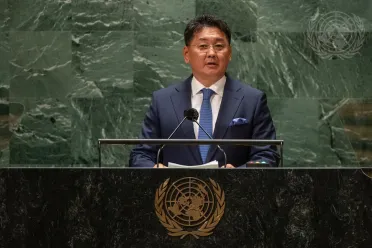Statement
Statement summary
UKHNAA KHURELSUKH, President of Mongolia, said that the fact his country and many others in Asia went through the COVID-19 crisis without substantial human rights conflicts demonstrates the advantage of the region’s communalistic culture over an individualistic one. It also revealed that the health sector was just as important as defence, requiring better risk management and preparedness, as well as greater investment. Thanks to the COVAX Facility and support from other countries, 65 per cent of Mongolia’s population is vaccinated. The spread of COVID-19 is decreasing, and the Government is taking steps to return the country to normal life.
Noting that this year marks the centennial of Mongolia’s people’s revolution, he said that his country’s diplomatic relations with 193 countries, membership in more than 70 international organizations and accession to more than 290 treaties demonstrate its growing role in international affairs. He thanked the United Nations’ significant contribution to Mongolia’s development, including its support through the pandemic and during repeated winter calamities. Recalling that Mongolia declared itself a nuclear-weapon-free zone in 1992, he said it is striving to become a trade and transit hub between Asia and Europe. It is also committed to regional economic integration.
“This horrendous phenomenon called war must be completely eliminated,” and conflicts must be resolved through peaceful means, he stated. Many believe that Chinggis Khan was a vicious man who conquered many nations, but in fact history shows that he was a diplomat and peacemaker. For almost 200 hears, Pax Mongolica prevailed over the great chessboard of Eurasia. Recalling his country’s peaceful transition to democracy in 1990, he proposed that 2 September — the anniversary of the end of the Second World War — be observed as an international day to mark humanity’s victory over war. He added that Mongolia, a troop contributor to United Nations peacekeeping operations, will host an international conference on female peacekeeping in 2022.
Due to the pandemic, Mongolia’s economy contracted by 4.5 per cent in 2020, but it is expected to grow by 4.8 per cent in 2021‑2022, he said. International financial organizations observed that the Government’s budgetary and fiscal measures protected the economy better than those of some developed countries. Going forward, the Government will focus on structural reforms, economic diversification, investment promotion and maintaining fiscal and financial stability. It also aims to reduce corruption and to become a “digital nation” by 2024, transferring almost all its public services online.
Turning to climate change, he said that lessons can be drawn from Mongolia’s nomadic heritage, combining respect for nature with the achievements of modern science and technology. Sandstorms are becoming a major problem for Mongolia, with a 2.2°C increase in the mean temperature and a 7 per cent decline in annual precipitation in the last 80 years, leading to land degradation and desertification. “The most efficient way to reverse desertification is by planting trees,” he pointed out. In that regard, a national campaign is under way to plant billions of trees by 2030. Ahead of COP26, he urged fellow world leaders to do more to combat climate change and build environmentally friendly societies and economies.

